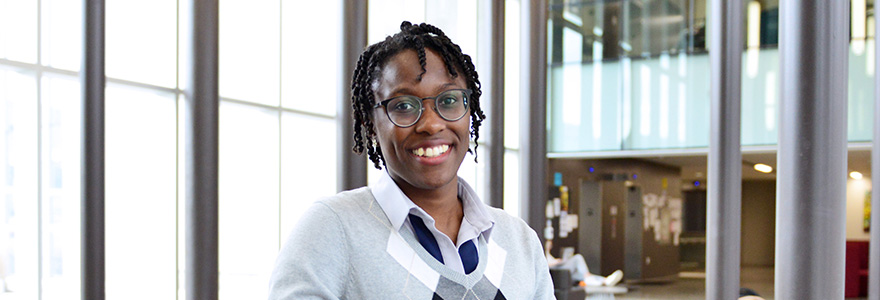Finding balance, building character

By Emily Leighton, MA'13
At the start of every academic year, Tracy Ssali, PhD Candidate, signs up for a class or activity that she’s never done before. She’s learned to canoe, tried her hand at knitting, built a computer and completed a 160-kilometre relay trail race with her lab mates, among other things.
“It’s uncomfortable to be bad at something, but I enjoy the process that goes into learning a new skill,” she said. “Trying new things, it builds character.”
This year, her choice was ballroom dancing.
Learning the steps to the foxtrot and the cha cha was a big change from her usual routine in the research lab. “As a scientist, I spend a lot of time reading and problem-solving. Dancing taps into other skills that I don’t regularly get to work on,” she said.
For Ssali, embracing new experiences helps her balance the demands of graduate school. “Taking time to pursue interests and hobbies, something that’s not research, is so important,” she said.
Born and raised in Brampton, Ontario, Ssali completed the Bachelor of Medical Sciences program at Schulich Medicine & Dentistry in 2013 and earned a master’s degree in 2016.
“The community of people and access to unique imaging equipment were big factors in my decision to pursue my PhD here," she said.
Ssali’s research is focused on mapping blood flow in the brain to better understand the different subtypes of frontotemporal dementia (FTD). There are several subtypes of FTD and symptoms are similar in the early stages of the disease – when treatment is more likely to be successful – making it difficult to develop therapies targeted to specific subtypes.
Supervised by Keith St. Lawrence, PhD, Ssali is assessing the feasibility of a magnetic resonance imaging (MRI) technique that measures tissue perfusion to address this issue.
Called arterial spin labelling, the technique magnetically labels blood flow throughout the brain. “Brain activity and blood flow are coupled,” explained Ssali. “In FTD, each subtype is characterized by a decrease in blood flow in a specific region of the frontal and temporal lobes.”
The current gold standard for measuring brain perfusion uses radiolabelled tracers with positron emission tomography (PET). But it’s an invasive procedure requiring an arterial line. “It’s not optimal for all patients, particularly for people with FTD,” said Ssali.
To validate arterial spin labelling as a diagnostic alternative, Ssali uses the hybrid PET/MRI system at St. Joseph’s Health Care London. With this technology, she is able to collect data simultaneously without the need for two separate scans. “We can compare the two techniques in the same physiological state, enabling a more accurate comparison,” said Ssali.
“We’re investigating whether arterial spin labelling gives us similar perfusion measurements as the current clinical standard,” said Ssali. “The next question will be, what is the variability if a patient is scanned on different days?”
The long-term goal is early diagnosis. “Ideally, we could monitor someone with a genetic predisposition for FTD, scanning them over the years to understand how the disease progresses,” explained Ssali. “An objective measure like perfusion could also help us identify imaging biomarkers, allowing us to develop and assess treatments targeted to the different FTD subtypes."
Nearing the end of her PhD studies, Ssali is starting to think about her next career move. Because much of her doctoral research involves analyzing medical imaging data, she says the data science field is a natural fit.
While the future may be a little uncertain at this point, Ssali says she’ll continue trying and learning new things wherever her career journey takes her. Next on her list? Travelling to the Yukon to see the aurora borealis and learning to play an instrument.
Personal Notes
Last book read: Sapiens: A Brief History of Mankind by Yuval Noah Harari
Most-used app: Podcast Republic – “I walk to work every day, so I’m always listening to podcasts.”
Favourite podcast(s): Hidden Brain; The Debaters; This American Life
How I stay organized: A paper planner – “I find it relaxing to write things down.”
Can’t live without: My family – “My family is incredibly important to me. My parents are the people I continue to look up to.”
Mentor: Udunna Anazodo, PhD – “She has been instrumental in my growth and she has inspired me to pursue opportunities I wouldn’t have otherwise considered.”
Something that’s stuck with me: The idea of building a network – “People want to help. Ask questions and put yourself out there. You don’t have to go it alone.”


